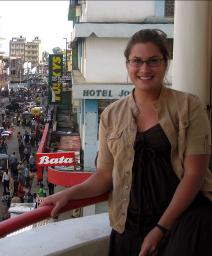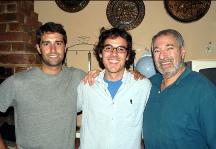|
Blog of the Month |
|
Applications Are In! |
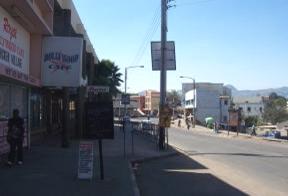
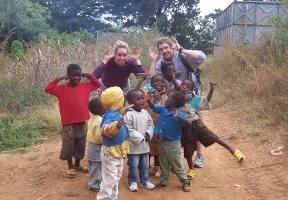

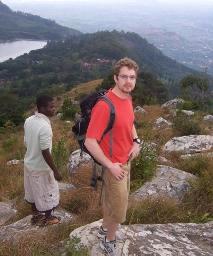
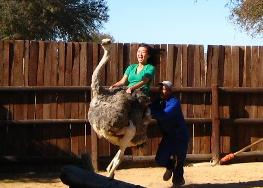
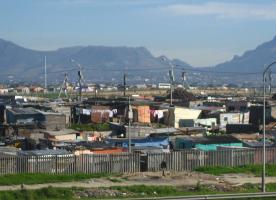
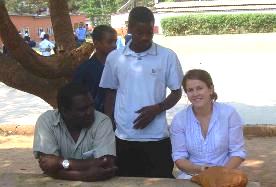
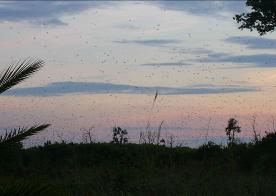
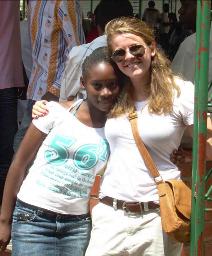
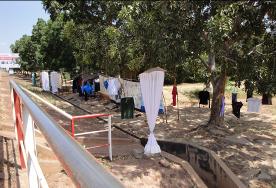
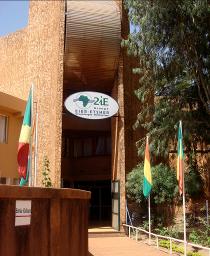





|
Fellows’ Flyer |
|
December 2009/January 2010 |
|
News and views for and by Princeton in Africa Fellows |
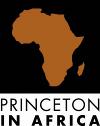

|
In this Issue: |
|
Highlights from 2009-2010 Fellows Jessica Grody in Burkina Faso, Libby Denniston in Zambia, Wenli Cai in South Africa, and Emily Miller in Mozambique |

|
Joe served as a PiAf Fellow in 2007-2008 with Jacana in Mozambique.
It may not be the case for all expatriates who work in Africa, but at least for me, Africa has a way of maintaining my interest and drawing me back. I first went to Africa in 2007 as a PiAf Fellow with Jacana, a humanitarian logistics organization based in Mozambique. This past summer I returned once again to work for the Malawi office of Imani Development, a private sector economic and management consultancy.
I initially applied to PiAf not out of any particular interest in a specific industry or nonprofit work, but rather, in all my idealism, I wanted to do my part to spur African economic development and potentially alleviate some amount of suffering. Although I am not sure how much conducting logistics advisory services during my time at Jacana served this goal, I am confident that my daily interactions with Mozambicans from all walks of life left a positive and lasting impact. Moreover, on a personal level, not only did I learn to speak Portuguese and conduct business transactions in a challenging environment, but I also came to understand that the opportunities to add value to African business, politics, and economics, though difficult to realize, were absolutely immense.
With this newfound perspective, I returned from Africa to begin the Master in Public Policy Program at Harvard’s Kennedy School of Government (HKS), and then soon found myself back on the continent, this time in Malawi, working for Imani Development. At Imani I was able to work on some amazing and important projects, including the acquisition of a slaughterhouse by a foreign investor and the economic analysis of a trade agreement between Malawi and the EU. Here, at the intersection of business, government, and economic development, I have found a potentially exciting and rewarding career path.
Conventional humanitarian aid and relief work undoubtedly has a valuable place in this world. While PiAf leads many a Fellow towards a career in this field, the program has steered me in a quite different, though I would like to think equally valuable, direction. Once I graduate from HKS with a concentration in international trade and finance, I will likely end up somewhere in the corporate world, whether in management consulting or corporate finance or strategy.
Will Malawi be my last African experience? Absolutely not. Rather, I want to learn the “tried and true” way to conduct business before returning my efforts to Africa. Africa is and will remain in my veins forever, and my ultimate career goal includes stimulating sustainable development on the continent, not through an exclusively government or nonprofit-sponsored project, but through a profitable business venture to provide a valuable product or service to African consumers. |
|
by Joe Falit |
|
Alum Update |
|
Joe hiking the Zomba Plateau in Summer 2009 |
|
A street in Blantyre, Malawi |
|
Joe and his girlfriend Stacey make some new friends |

|
During my first few weeks in Africa, I obsessively kept track of important milestones. I could tell you exactly how many times I’d ridden on a moto, braved the food and tap water at the university cafeteria, and purchased fruits and vegetables on my own. Last week, I realized I’d hit a new milestone: I was no longer diligently keeping track of all those experiences. I met someone who asked how long I’d been in Burkina and I really had to stop and think about it for a few minutes. That was when I knew that I was getting comfortable enough to stop thinking of this place as foreign and start seeing it as home.
Burkina Faso, the country I currently call home, doesn’t have much in the way of money, water, natural resources, or exotic wildlife. However, it does boast Africa’s best-named capital city: Ouagadougou (pronounced wah-gah-doo-goo). It is also home to the International Institute for Water and Environmental Engineering, or 2iE, which is the only western-accredited university in Africa specializing in environmental engineering and is where I am working this year.
Over the course of the year, I will be researching ceramic water filters as a cost-effective and culturally appropriate way for rural communities to purify their drinking water. Each year, over two million people, mostly children, die from diarrheal diseases caused by dirty water. Providing clean water to the one billion people who lack access to improved water sources can significantly reduce this number, as well as improve overall health and productivity. Ceramic water filters are one of the most promising treatment technologies, offering a way for each household to purify its drinking water so it is safe to drink.
My research combines microbiology and social science. I am testing filtered water for bacterial content, measuring flow rates, and evaluating several cleaning methods. I am most looking forward to beginning my work in the field – visiting communities outside Ouaga where a pilot study of the filters is underway. In addition to collecting water samples to determine the efficacy of the filters under normal use circumstances, I will interview households about their water consumption habits, concerns with the ceramic filters, and general health status. This is an especially important part of my project because technologies like the ceramic water filter will never be adapted unless they have the support of the local community and provide proven public health benefits to the community.
I have also been busy trying to learn all the common cultural practices. For example, when you see people you know, you absolutely must stop, say hello, and ask how they are doing. This means I have to allow an extra ten minutes to get anywhere to make sure I have time to greet everyone I meet. Additionally, I’ve discovered that the easiest way to make friends is to learn a few words in Mooré, the local language. Just practicing a few phrases indicates that you are making an effort to become part of the culture. So far, I can say “good morning,” “good evening,” “how are you?” and “I’m fine,” but I’m trying to practice a little more each day.
By now, I have experienced enough of the typical African firsts to feel a little at home here. However, I am still doing my best to record every new adventure, big or small. I know my learning here will continue, both in and out of work, and I don’t want to forget any of it. |
|
by Jessica Grody, ‘09-’10 Fellow at the International Institute for Water and Environment Engineering in Burkina Faso |
|
Notes from the Field |
|
Clothes, mosquito nets, and other goods for sale on the roadside in Burkina Faso |
|
Jessica samples a local beverage from a calabash |

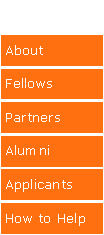
|
Heading to Africa?
Alumni and friends of PiAf: please let us know if you are planning a trip to Africa! We would be happy to connect you with any current Fellows who may be in or near the area you will be visiting. PiAf Fellows enjoy visitors and we are sure you would enjoy meeting them and hearing more about their work in the field! Email piaf@princeton.edu. |

|
“Madam, what caused World War I?” “Is there racism in America?” “What is Richard III about?”
I balk at many of the questions my students ask me—they have so much faith in my knowledge and always seem surprised when I have to get back to them after some research. I am in Lusaka, the capital of Zambia, working for a small NGO called the Kucetekela Foundation (KF), which provides scholarships to disadvantaged but academically promising Zambian students. We currently have 26 students placed in three different secondary schools. There is soft-spoken Martinoh who comes to my tutoring every day although he is the top student in his class. He aspires to be a veterinarian, so I recently took him to shadow a vet and his face lit up as he told me how he held the dog during a procedure. Then there is the tenacious Gaella, a refugee from the Congo and the recipient of almost every award at her school’s prize giving day ceremony. She bombards me with questions about American history and culture, always keeping me on my toes. I wish I could tell you about them all—they are amazing stories but also just regular kids who love Akon and playing soccer.
I am here to tutor the kids, improve the mentoring system in place, and explore opportunities for the students once they graduate. I also teach a grade 8 English class at one of our partner schools. The students are amazing—engaged and intellectually curious, they come to me every afternoon with these questions, and I do my very best to answer them. I have learned Zambian geography, mastered balancing chemistry equations, and relearned the quadratic equation. And now I am in the midst of reading Richard III… Their belief in my omniscience has driven me to master as many of the topics as I can.
More generally, living in Zambia overall has been a combination of the familiar (with grocery stores and students obsessed with High School Musical and Miley Cyrus) to the totally foreign (when I realized that a basket filled with beans was actually dried caterpillars or sitting through a thunderstorm so powerful it shook my house like an earthquake). I have now tried almost every part of the cow—intestines, tail, and hooves (trotters, as they call them) included. Next, caterpillars and termites…
Top Five Funniest Moments 1. when a vendor tried to sell me a live duck at a stop light 2. seeing the migration of a million bats—the largest mammal migration in the world—in Kasanka in central province in Zambia 3. a power cut in the middle of cooking Thanksgiving dinner 4. finding out my turkey was from Brazil—a truly international Thanksgiving 5. being called “Michael Jackson” by a small Zambian boy |
|
Notes from the Field |
|
Libby, with some of her KF colleagues |
|
The bat migration (the largest mammal migration in the world) at sunset in Kasanka, a national park in Zambia’s central province. |
|
Libby, right, with one of the KF scholars, Mary |

|
The last thing I expected to do this year was fall off an ostrich. In my defense, you can’t really grab onto their scrawny necks like you could a horse, but this doesn’t make it any less awkward. In fact, Cape Town has been providing more than its fair share of “things I never thought I’d do,” the second of which would be climbing a mountain. Granted, the trek up Table Mountain involved three hours of sweat, stumbles, and choice four-letter words that would put a sailor to shame, but there are few things more rewarding than looking down at an expanse of city, beach, and ocean from a height you reached with your own two (aching, blistered) feet. Cape Town, especially from above, is every bit as breathtaking as the travel guides promised it would be, and I am grateful for having the opportunity to be here… even if it means occasionally sliding off the back of a giant galloping bird in front of a dozen strangers.
People like to joke that Cape Town isn’t Real Africa, and though I’d initially agreed, six months here has provided a chance to delve a little deeper beneath the surface. Yes, the roads are paved, city hall looks like it could have been lifted straight out of Western Europe (and in fact much of the building material was), and sushi is more ubiquitous than freshly-slaughtered goat roasted over a fire, but all these first-world trappings only make more apparent the disparity between those who spend their weekends at vineyards tasting local wines, and those they pass on the drive out; this second group, the overwhelming majority of the population, lives in townships composed of corrugated metal shacks, formerly shipping containers. It’s a humbling thing to witness, and if this isn’t in some dark way exactly what Real Africa is still struggling with decades after European decolonization, I don’t know what is.
My fellowship is at mothers2mothers, an innovative public health NGO working to prevent mother-to-child transmission of HIV (PMTCT) in Southern and Eastern Africa. m2m does not provide medical services; rather, we fill the gap between HIV-positive pregnant women and new mothers and the overburdened healthcare staff who simply don’t have the time to do more than draw blood and dispense medication. Though biomedical interventions are critical for PMTCT, pills do very little to battle the stigma and discrimination an HIV-positive woman may face in her community—not to mention that the pill regimens themselves are confusing and oftentimes overwhelming. This is where m2m comes in: we train and employ Mentor Mothers, themselves HIV-positive women, to provide peer education and psychosocial support. They are open about their HIV status, proud of their role in PMTCT, and passionately—and compassionately—devoted to their clients.
For all my good intentions, at the end of the day, I’m not saving any babies. This is okay with me, because my job is supporting the staff in the office, who are supporting the staff on the ground, who are supporting our clients. At the end of the day, it is the Mentor Mothers who are helping our clients save their own babies, and I’m lucky to be able to witness the process. The most important lesson I’ve learned so far is that providing HIV-positive pregnant women with the education and support to realize their own agency is the key to empowerment.
That, and: when awkwardly perched atop the back of an oversized bird, hold on tight to the wings. |
|
by Wenli Cai, ‘09-’10 Fellow at mothers2mothers in South Africa |
|
Notes from the Field |
|
Wenli holds on to that ostrich for dear life |
|
One of Cape Town’s townships |
|
Wenli, whale-watching in Hermanus |
|
The main entrance to 2iE, where Jessica works |
|
Update from PiAf alumnus Joe Falit, who worked in Malawi this summer on economic development initiatives |
|
by Libby Denniston, ‘09-’10 Fellow at Kucetekela Foundation in Zambia |
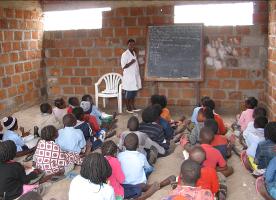
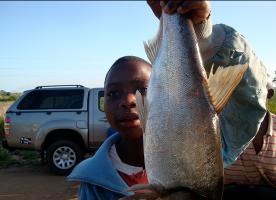
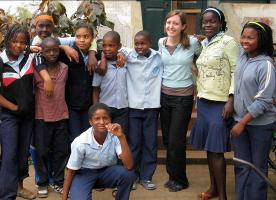


|
Eight thousand miles and forty hours put me in Maputo, faced with an unquantifiable feeling of uncertainty. My best attempts aside, committing all available guidebooks to memory had given me little to work with. Still, my first step on African soil was not without expectations. I anticipated extreme poverty. I readied myself for challenging living conditions. I was energized by the prospect of overwhelming culture shock. This, I thought, was Mozambique.
Now, four months into my fellowship, I write from a spacious, sea-view living room, fresh from a day of work and Portuguese class at the clean, well-ordered confines of the United Nations World Food Programme (WFP). When I return to my bedroom upstairs, I will fall fast asleep under a mosquito net that does more to recall images of princesses than the horrors of malaria. I cannot shake the irony.
The Maputo known to foreigners is a vibrant city, an exciting city, but an exclusive city. Outside money has painted the country's capital with a cosmopolitan veneer, masking the pleas of the urban poor in a rapidly developing expatriate haven. As evidence, a mere five-minute walk from my luxurious flat and the surrounding upscale restaurants provides a tour of abandoned buildings, heaps of trash, and makeshift dwellings.
At times, this disparity makes it difficult to comprehend the challenges faced by a vast majority of the population. A large portion of my work in the Public Information and Programme units at WFP consists of writing and editing reports and advocacy material. I liken it to being a staff journalist. Yet my day-to-day manipulation of startling facts and figures sometimes becomes just that – a routine devoid of tangible meaning. It is not until I venture into the field, to visit the homes of nutrition supplement recipients, or to help with distributions at rural schools, that the harsh realities faced by WFP’s beneficiaries come to life.
Still, I couldn’t have picked a better time to come to Mozambique. For the past two months, I’ve observed the country prepare for and conduct its fourth democratic elections, set to the tune of enormous motorcades moving from one rally to the next. Led by a truck equipped with massive megaphones blasting infectious campaign music, a procession of twenty cars would drive throughout the city, incessantly honking horns, as fifty people crammed into the back of a flatbed truck cheered and waved flags while dancing and singing. As my coworkers like to remind me, “Mozambicans are never serious.”
Yet this bustle, this energy, is nothing new. They say that New York never sleeps, but I wager Maputo could give the Big Apple a run for its money. Whether it’s the undying beats of the disco-style clubs, the late night chatter of guards on the streets, or the early morning wake up calls from the wedding choirs across the street, the vitality of the city and its people doesn’t cease to inspire. |
|
by Emily Miller, ‘09-’10 Fellow at UN World Food Program in Mozambique |
|
Notes from the Field |
|
A classroom at a school in Manica, Maputo province, where students are beneficiaries of WFP’s Food for Education program |
|
In testament to their innovative spirit, Mozambicans will try to sell you anything through a car window, including but not limited to dried fish, raw fish, power strips, and puppies. |
|
Emily (third from right), with students at a school in Matutuine, Maputo province, after the distribution of school sports kits donated by the International Olympic Committee. |
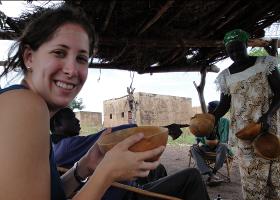
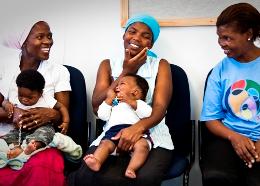
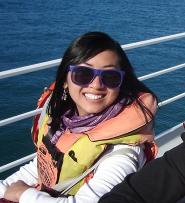
|
A m2m Mentor Mother at a clinic with two clients and their babies |
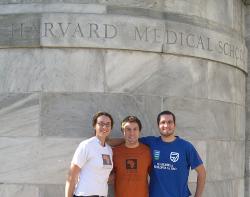
|
We Need Your Support !
Please donate to PiAf’s end of the year fundraising drive! We aim to raise $10,000 to fill our scholarship coffers for the 2010-2011 fellowship year.
We need your support to help us achieve our mission of developing young leaders committed to Africa’s advancement.
By supporting Princeton in Africa, you are not just impacting the life of one individual, but lives within our own communities and across the continent of Africa.
Your gift is 100% tax-deductible. |
|
PiAf Alumni at Harvard
Three PiAf alums entered the class of 2013 at Harvard Medical School this fall. Pictured below—in their PiAf t-shirts—by the HMS gates are Devan Darby (Botswana, 06-07), Mike Honigberg (Malawi, 08-09), and David Bartels (Lesotho, 06-07). We wish them the best of luck as they earn their MDs! |
|
The application deadline for 2010-2011 fellowships was December 7. We received 250 applications from graduates of 66 schools across the country. There is clearly incredible interest for this type of program, and we are pleased to offer opportunities to a wider group of candidates. We feel this new policy will enable us to continue to place the highest caliber of young leaders in Africa.
Many thanks for your help spreading the word about PiAf to so many talented applicants.
We invite PiAf alumni to assist us with interviewing prospective candidates on campus January 8-10 and January 15-17. We will also be conducting phone interviews January 11-14. Are you free to help? Please email piaf@princeton.edu. |
|
Name of blog: Destination Mpala
Written by: Allison Williams, 2009-2010 Fellow at Mpala Research Center in Kenya
From a recent posting: “I was determined not to let [Thanksgiving] pass without celebrating in some type of fashion. There are a few Americans around and several Kenyan friends who were intrigued by the tradition. I met with the head cook Eunice and the administrative assistant Joseph. Together, we sketched a festivities blueprint. The most challenging feature of the day was going to be acquiring and cooking a Turkey. I have seen about a million and five chickens and roosters, but have never come across a turkey…”
Read more of Allison’s blog here! |
